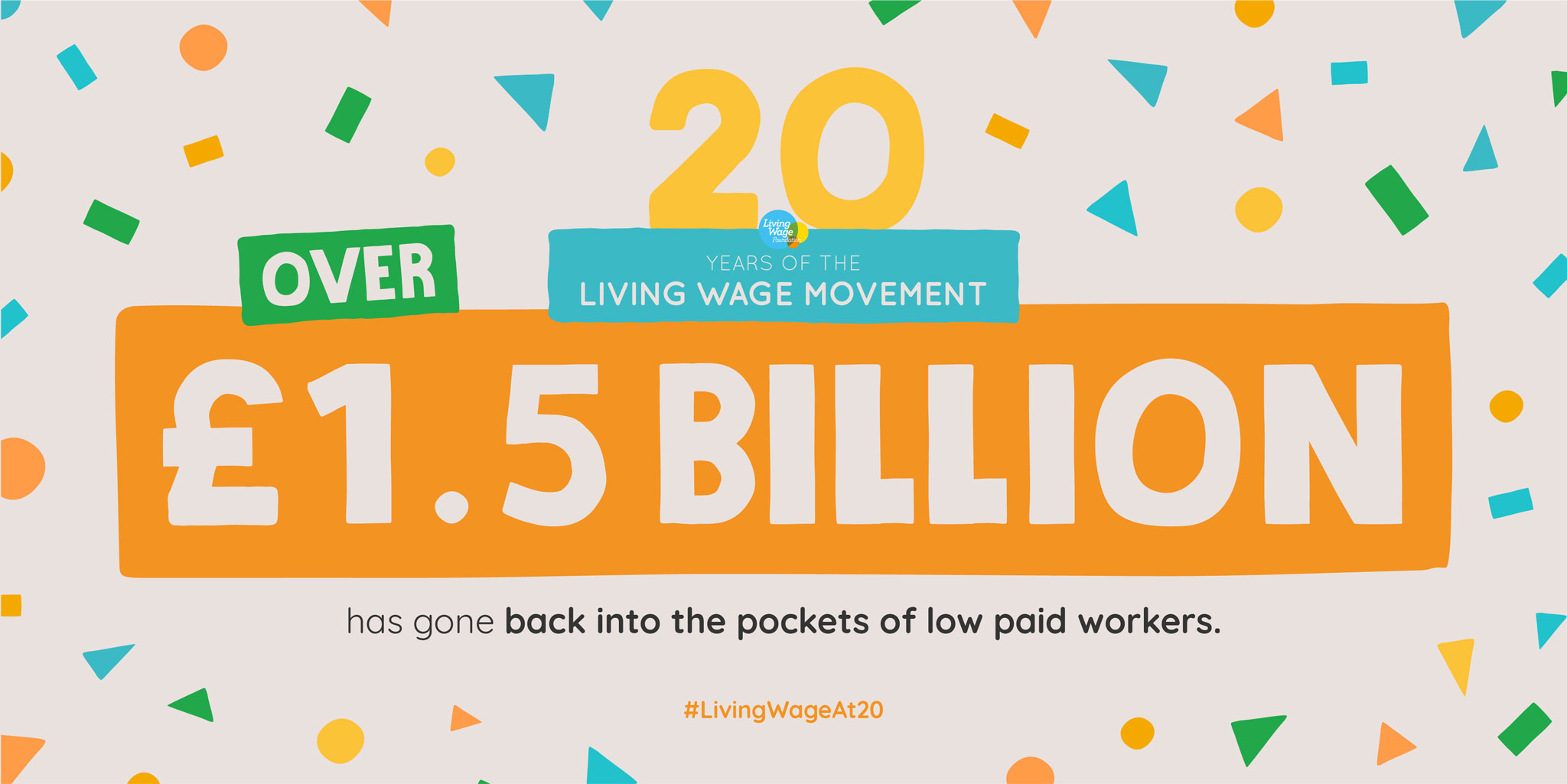Over £1.5 billion in increased wages has been put back into the pockets of workers through the campaign for a real Living Wage over the past 20 years, according to new research published today by the Living Wage Foundation and Cardiff Business School. Key findings of the study include:
-
Since its inception 20 years ago, the Living Wage campaign has put back more than £1.53bn into the pockets of over 260,000 low-paid workers.
-
Almost three-quarters of employers paying the real Living Wage said that accrediting with the Living Wage Foundation had improved their reputation as an employer.
-
The number of Living Wage Employers has continued to grow, even during the pandemic, with over 2,600 more employers committing to pay the real Living Wage since the 23d March lockdown last year.
The real Living Wage is the UK's only independently calculated wage rate based on meeting people's everyday needs, it is currently £9.50 an hour outside of London and £10.85 within the capital. Since its creation in East London in 2001, the Living Wage campaign has grown from a Citizens UK initiative into a movement of over 8,000 accredited employers, including major employers like IKEA, National Express, Aviva, Burberry, Everton and Liverpool football clubs, nearly half the FTSE 100 and thousands of small and medium sized businesses.

Rukky, a Cleaner at Clean for Good, said:
"Being paid the Living Wage has made a big difference to my family. I can spend more time with my children now. I have also been able to save some money and I feel a lot happier now. Minimum wage wasn't enough money to live on and it made me very stressed. I want to stay working here if I can. I feel like they respect me."
Graham Griffiths, Director of the Living Wage Foundation, said:
"Over the past twenty years we've seen hundreds of thousands of people's lives changed by the real Living Wage. It's allowed people to spend more time with their families, save for the future, and enjoy the stability and security necessary to thrive. We know too that the Living Wage has transformed employers across the country, and we've been delighted to see businesses continue to accredit at an astonishing rate during the pandemic. As we look to recover from this crisis, it's clear that that must rebuild on the solid foundations that the real Living Wage provides."
Edmund Heery, Professor Emeritus, Cardiff Business School, said:
"A striking of feature of the Living Wage campaign is that it has produced mutual gains for employees and for their employers. The Living Wage has transferred millions of pounds to the pockets of low-paid workers, with part-time employees and those working on outsourcing contracts particularly likely to benefit. But the Living Wage has also benefited many employing organizations, enhancing reputation, improving recruitment and retention and, for some, helping to win contracts or funding. The evidence shows emphatically that both parties can gain from higher employment standards."
The Mayor of London, Sadiq Khan, said:
"I would like to congratulate the Living Wage Foundation on 20 years of helping to ensure a fair wage for the lowest-paid workers. Since I became Mayor, the number of organisations paying the London Living Wage has more than doubled to 2,200 and my Good Work Standard has just accredited its 100th employer.
However, there is more to do while low pay persists in our economy. Nearly 20 per cent of jobs in London are still paid below the London Living Wage. Ensuring that Londoners are paid a living wage and can access good quality jobs is fundamental to our city's recovery from the pandemic, which is why I am committed to protecting and creating jobs, supporting new and growing businesses, promoting fair and inclusive workplaces and giving Londoners the skills they need to prosper, including supporting them into good jobs."
Research conducted by Cardiff Business School also highlighted the benefits of the Living Wage to business. A survey of 1,530 Living Wage Employers found:
-
59% said it improved retention of employees receiving LW
-
60% said it improved recruitment of employees into jobs covered by LW
-
54% said it improve quality of applicants for LW jobs
-
62% said it improve relations between staff and manager
-
30% said it reduced sickness absence
Jenny Baskerville, Head of Inclusion, Diversity and Social Equality at KPMG UK and Chair of the Living Wage Foundation Advisory Council, said:
"KPMG UK has long championed the real Living Wage, as both a Principal Partner of the Living Wage Foundation and having been an accredited employer since 2012. We, and the growing number of businesses, recognise the importance of having wages better reflect the cost of living. So much progress has been made over the past two decades, which is incredibly encouraging but we must remember that in-work poverty remains a real issue. As we emerge from the pandemic, we must take note of the rising inequalities and economic challenges that lie ahead - there is work still to be done."
Press and Media Enquiries
John Hood, Senior Communications Manager - john.hood@livingwage.org.uk / 07507 173649
Tom Blin, Communications Officer - thomas.Blin@livingwage.org.uk / 07706 217589
About the research
Data was compiled by Cardiff Business School through a survey of 1,530 Living Wage Employers. For a full report please contact John Hood at john.hood@livingwage.org.uk or 07507 173 649
